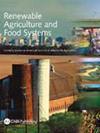城市社区园林有毒植物的发生与多样性
IF 2
3区 农林科学
Q2 AGRICULTURE, MULTIDISCIPLINARY
引用次数: 0
摘要
城市社区花园促进人类健康,提供休闲空间,支持城市生物多样性。城市花园位于不同的景观环境中,拥有不同的园艺经验和背景的园丁具有不同的社会背景,这两者都导致城市花园栖息地的植物种类繁多。这些植物代表了一系列的特征,其中之一可能是产生对人类有毒的物质。这些植物也可能具有生态系统功能和生物多样性保护价值,创造了促进人类健康的生态系统服务权衡。本文报道了德国两个城市(柏林、慕尼黑)30个城市社区花园中有毒植物种类的发生情况,并讨论了城市花园中有毒和剧毒植物的潜在问题。我们的结论是,根据花园参与者和花园组织的目标,应该仔细监测和管理有毒植物,以减轻健康风险,同时支持生物多样性保护。我们提出了可能的策略来管理这些植物带来的潜在威胁,同时允许它们与城市花园中的人们一起生活。本文章由计算机程序翻译,如有差异,请以英文原文为准。
Occurrence and diversity of poisonous plants in urban community gardens
Abstract Urban community gardens promote human health, offer recreational space and support urban biodiversity. Urban gardens are situated in diverse landscape contexts and have diverse social contexts with gardeners of various horticultural experiences and backgrounds, both of which results in the wide plant species variety of urban garden habitats. These plants represent a range of traits, one of which may be the production of substances that are poisonous to humans. These plants may also be of ecosystem functioning and biodiversity conservation value, creating an ecosystem service trade-off of human health promotion. In this paper, we report on the occurrence of poisonous plant species in 30 urban community gardens in two German cities (Berlin, Munich) and discuss potential concerns around poisonous and highly poisonous plants in urban gardens. We conclude that, depending on the garden participants as well as the goals of the garden organization, poisonous plants should be carefully monitored and managed to dually mitigate health risks while supporting biodiversity conservation. We propose possible strategies to manage potential threats posed by these plants while simultaneously allowing them to reside alongside people in urban gardens.
求助全文
通过发布文献求助,成功后即可免费获取论文全文。
去求助
来源期刊

Renewable Agriculture and Food Systems
农林科学-农业综合
CiteScore
5.20
自引率
7.40%
发文量
39
审稿时长
>36 weeks
期刊介绍:
Renewable Agriculture and Food Systems (formerly American Journal of Alternative Agriculture) is a multi-disciplinary journal which focuses on the science that underpins economically, environmentally, and socially sustainable approaches to agriculture and food production. The journal publishes original research and review articles on the economic, ecological, and environmental impacts of agriculture; the effective use of renewable resources and biodiversity in agro-ecosystems; and the technological and sociological implications of sustainable food systems. It also contains a discussion forum, which presents lively discussions on new and provocative topics.
 求助内容:
求助内容: 应助结果提醒方式:
应助结果提醒方式:


